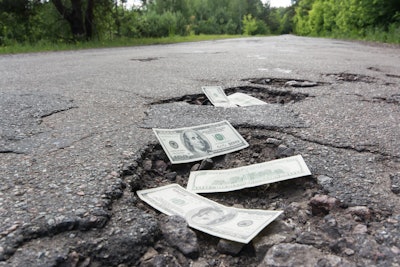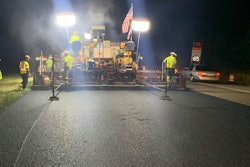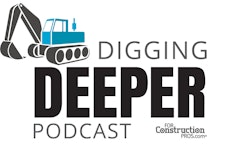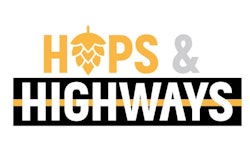
Established in 1956, the Highway Trust Fund (HTF) uses the federally established gas tax to help fund our nation's roads, bridges and highways. Each time you fill up your gas tank, you are helping to pay for the roads you're using. In fact, roughly 51% of road and bridge projects in the United States are funded through the use of the HTF.
The issue with this driver funded program however, is that the current gas tax hasn't been raised since 1993 and the user fee has not been indexed for inflation. Add to that the fact that cars are increasing in fuel economy and consumers are leaning more toward hybrid vehicles, and we're talking big trouble for infrastructure funding.
Congress has transferred roughly $144 billion to the Highway Trust Fund since 2008 to keep it solvent, according to the Congressional Research Service. Last year, Congress provided an additional $13.6 billion in a stopgap spending measure to keep the fund afloat, punting longer-term decisions about the fund’s solvency to this year.
Many states have started to experiment with pilot programs for vehicle miles traveled (VMT) or road usage charges and even Transportation Secretary Pete Buttigieg talked of these fees at his confirmation hearing, acknowledging that privacy and technological concerns accompanying a VMT fee would need to be resolved before being rolled out nationwide.
Grants Announced to Study Road Usage Charge
The U.S. Department of Transportation’s Federal Highway Administration (FHWA) has awarded $18.7 million in “Surface Transportation System Funding Alternatives” (STSFA) grants to eight projects, led by six state Departments of Transportation and two transportation coalitions, to test new user-based funding methods for highways and bridges. The program will help states explore innovative new ways to provide long-term support for the HTF.
“The pilot projects under the STSFA program allow states to learn more about potential new user fees structures that can complement traditional funding sources that states rely on to build and improve the nation’s highway and bridge infrastructure,” said Acting Federal Highway Administrator Stephanie Pollack.
Since its creation in 2016, the STSFA grant program has provided $73.7 million to 37 projects in states across the nation. It funds projects that test the design, implementation and acceptance of user-based systems, such as a mileage-based fee. They also support outreach by transportation officials to help the public understand these new methods.
The “Fixing America's Surface Transportation” (FAST) Act directs the FHWA to establish the STSFA grant program to let states demonstrate new fee-based revenue mechanisms that could supplement the HTF. Among other things, the STSFA program requires applicants to address equity concerns, such as the fees’ impacts on differing income groups and geographic areas. It recognizes that a mileage-based, road-user charge system may potentially redistribute cost burdens among different users.
Recent reports and evaluations of active STSFA grant program demonstrations have outlined key lessons learned and identified several important factors for implementing road-user charge programs including -- data security, interoperability among multiple states, program administrative costs and public acceptance.
The list of projects are below.
STSFA Grant Selections 2020
California Department of Transportation (Caltrans)
Road Charge Pilots Program: Caltrans will test the viability of current global positioning system technology to determine which roads are part of a public network and may be subject to a fee.
Amount: $2,150,000
Delaware Department of Transportation/Eastern Corridor Coalition (formerly I-95 CC)
Testing Implementation Paths for Mileage Based User Fees (MBUF): The Coalition will demonstrate and test paths for MBUF in the DC metro area and seven states -- DE, MD, ME, NC, NJ, PA and VA.
Amount: $4,670,000
Hawaii Department of Transportation
Digital Mapping Data, Distance-Precision, and Transportation Taxation: Hawaii DOT will investigate the current state and completeness of digital mapping data to determine which roads are part of a public network and may be subject to a fee.
Amount: $250,000
Kansas/Minnesota Departments of Transportation
RUC Demonstration Project: Kansas DOT will lead a joint effort working with Minnesota DOT to explore the impacts of RUC implementation in the Midwest, with focus on rural and agricultural populations and intrastate and interstate commercial freight and supply chain operators.
Amount: $3,250,000
Ohio Department of Transportation
Alternative User Based Revenue Initiative: Ohio DOT will obtain data for a large-scale outreach program geared towards educating the public about RUC.
Amount: $2,000,000
Oregon Department of Transportation/RUC West
Road Usage Charge Summit: RUC West will host a conference that will explore opportunities and barriers to interoperability, expand knowledge about RUC and foster new partnerships.
Amount: $134,875
Texas Department of Transportation
Demonstration of Smartphone-Based Alternative to Current Gas Tax Structure: Dallas-Fort Worth will assess the feasibility and technological capability of utilizing smartphone technology to understand travel patterns and the development of an accounting framework.
Amount: $5,000,000
Utah Department of Transportation
UDOT will use 3-D modeling software, e-Construction, drones and other FHWA-supported technologies to improve project delivery.
Amount: $1,250,000
TOTAL: $18,704,875




















